 Certainly, the virtual dimension will take a new importance, also in light of the massive use of digital tools that this new reality brought with itself, but also in relation to the fact that artists might end up not traveling a lot like before…who knows! The art that will change is only in relation to travel and distance. What could definitely change might be the distribution channels, moving more and more into streaming and digital platforms…but I really hope that this won’t happen. The emotion that live art arouses is incomparable.
Certainly, the virtual dimension will take a new importance, also in light of the massive use of digital tools that this new reality brought with itself, but also in relation to the fact that artists might end up not traveling a lot like before…who knows! The art that will change is only in relation to travel and distance. What could definitely change might be the distribution channels, moving more and more into streaming and digital platforms…but I really hope that this won’t happen. The emotion that live art arouses is incomparable.
12.03.2021 | by Marcos Jinguba
 The oppressive policies and structural inequities that underlie the conditions of poor and working class people’s lives here and abroad date from the first invasion of native territories, and the last few decades have exacerbated these conditions. What our older films reveal is the similarity of conditions now with what existed 50 years ago.
The oppressive policies and structural inequities that underlie the conditions of poor and working class people’s lives here and abroad date from the first invasion of native territories, and the last few decades have exacerbated these conditions. What our older films reveal is the similarity of conditions now with what existed 50 years ago.
03.03.2021 | by Keelyn Bradley
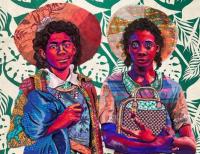 In Bisa's artwork , color is a language that speaks about African American evolution from enslavement in the United States to today's ongoing fight for Black liberation Bisa also draws on her Ghanaian heritage by illustrating the vibrancy of Africa's textile and fabric traditions. These artistic methods allow her to examine several themes including family, community, youth and power.
In Bisa's artwork , color is a language that speaks about African American evolution from enslavement in the United States to today's ongoing fight for Black liberation Bisa also draws on her Ghanaian heritage by illustrating the vibrancy of Africa's textile and fabric traditions. These artistic methods allow her to examine several themes including family, community, youth and power.
06.01.2021 | by Ugonna-Ora Owoh
 Today, tens of thousands of girls under the age of 18 were married off. Today, one in three women can expect to experience some form of physical or sexual violence in their lifetime. This needs to change, and it needs to change now. Each of these numbers tells a personal story and each one of these women or girls could have been my friend, my sister, my mother, my daughter, or me. That is what motivates me to create a better world for women and girls, no matter where they may be.
Today, tens of thousands of girls under the age of 18 were married off. Today, one in three women can expect to experience some form of physical or sexual violence in their lifetime. This needs to change, and it needs to change now. Each of these numbers tells a personal story and each one of these women or girls could have been my friend, my sister, my mother, my daughter, or me. That is what motivates me to create a better world for women and girls, no matter where they may be.
14.12.2020 | by Regina Jane Jere and Natalia Kanem
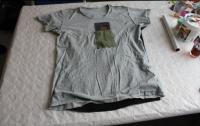 Somewhere in between there is something more human that tries to understand these people, imagine if you had to flee your home and you could one carry one thing with you, how would you continue to be yourself? On top of fleeing and experiencing a traumatic conflict you turn up in a place that is supposed to be civilized and you get treated like an abomination. This project is about to try to humanize migrants and make them individuals and real people, our friends, our neighbors.
Somewhere in between there is something more human that tries to understand these people, imagine if you had to flee your home and you could one carry one thing with you, how would you continue to be yourself? On top of fleeing and experiencing a traumatic conflict you turn up in a place that is supposed to be civilized and you get treated like an abomination. This project is about to try to humanize migrants and make them individuals and real people, our friends, our neighbors.
26.11.2020 | by Alícia Gaspar and Rachael Kiddey
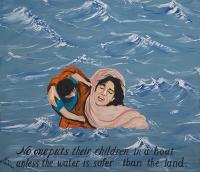 It has to do with the colonial history of Europe as a whole: I see this phenomenon of migration from the global south to the global north as the latest phase in the long history of racialized capitalism and colonialism. Many of these people who are trying to cross are coming from previously colonized countries by Europe. We know that, that long history of colonization has an impact in the present in terms of structural inequality, poverty, dispossession and war, and at the same time that we are seeing is the inability of Europe to come to terms with its own history. Which is a history of colonization, of course, instigated by proto-capitalism and capitalist developments as well as the hierarchy of racialization and the legacy of whiteness and white supremacy which fueled the whole colonial condition.
It has to do with the colonial history of Europe as a whole: I see this phenomenon of migration from the global south to the global north as the latest phase in the long history of racialized capitalism and colonialism. Many of these people who are trying to cross are coming from previously colonized countries by Europe. We know that, that long history of colonization has an impact in the present in terms of structural inequality, poverty, dispossession and war, and at the same time that we are seeing is the inability of Europe to come to terms with its own history. Which is a history of colonization, of course, instigated by proto-capitalism and capitalist developments as well as the hierarchy of racialization and the legacy of whiteness and white supremacy which fueled the whole colonial condition.
25.11.2020 | by Alícia Gaspar and Yannis Hamilakis
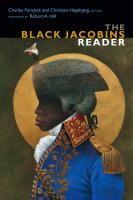 Stuart Hall once wrote that James in The Black Jacobins was the first to centre Atlantic slavery in world history – so in this sense the importance of James’s work to these debates is self-evident. Certainly, James’s short discussion on the economic roots of British parliamentary abolitionism formed the essential outline of Eric Williams’s more famous and lengthy contribution in this field – as Williams himself acknowledged, though in my opinion James’s grasp of the modernity of colonial slavery and the slave ships and plantations thanks to his underlying theoretical grasp of the uneven and combined nature of capitalist development meant his analysis of the exact relationship between capitalism and slavery is more sophisticated than that of Williams in many respects.
Stuart Hall once wrote that James in The Black Jacobins was the first to centre Atlantic slavery in world history – so in this sense the importance of James’s work to these debates is self-evident. Certainly, James’s short discussion on the economic roots of British parliamentary abolitionism formed the essential outline of Eric Williams’s more famous and lengthy contribution in this field – as Williams himself acknowledged, though in my opinion James’s grasp of the modernity of colonial slavery and the slave ships and plantations thanks to his underlying theoretical grasp of the uneven and combined nature of capitalist development meant his analysis of the exact relationship between capitalism and slavery is more sophisticated than that of Williams in many respects.
18.11.2020 | by Christian Hogsbjerg, Charles Forsdick and The Public Archive
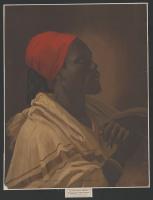 In Toussaint Louverture: A Black Jacobin in the Age of Revolutions (Pluto) Charles Forsdick and Christian Høgsbjerg have produced what is arguably the most important biography of Louverture since CLR James’ magisterial Black Jacobins was first published in 1938. Kicking against the contemporary anti-Black and anti-radical revisionism that downplays the historical importance of the revolution while dismissing the significance of Louverture himself, Forsdick and Hogsbjerg’s short monograph is urgent, timely, and strikingly well-written. They have also created a sort of supplement to the book, editing The Black Jacobins Reader (Duke), an excellent collection of essays, commentaries, and primary source material that provides additional context and critique for the writing, production, and circulations of James’ classic history.
In Toussaint Louverture: A Black Jacobin in the Age of Revolutions (Pluto) Charles Forsdick and Christian Høgsbjerg have produced what is arguably the most important biography of Louverture since CLR James’ magisterial Black Jacobins was first published in 1938. Kicking against the contemporary anti-Black and anti-radical revisionism that downplays the historical importance of the revolution while dismissing the significance of Louverture himself, Forsdick and Hogsbjerg’s short monograph is urgent, timely, and strikingly well-written. They have also created a sort of supplement to the book, editing The Black Jacobins Reader (Duke), an excellent collection of essays, commentaries, and primary source material that provides additional context and critique for the writing, production, and circulations of James’ classic history.
18.11.2020 | by Charles Forsdick, Christian Hogsbjerg and The Public Archive
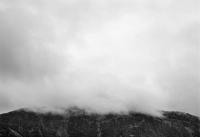 In 2010 Marta Lança set up the BUALA website, of which she is still the editor and the main driving force. To mark the 10th birthday of this unique platform dedicated to “exploring the synergies between art, theory, and activism in order to stimulate public debate about the lasting impact of racism and colonialism across Portuguese-speaking communities”, maat is hosting a special cycle of presentations, talks and screening entitled “and I am sparse in dense fluidity” – Gestures of Freedom”, curated by BUALA’s founder.
In 2010 Marta Lança set up the BUALA website, of which she is still the editor and the main driving force. To mark the 10th birthday of this unique platform dedicated to “exploring the synergies between art, theory, and activism in order to stimulate public debate about the lasting impact of racism and colonialism across Portuguese-speaking communities”, maat is hosting a special cycle of presentations, talks and screening entitled “and I am sparse in dense fluidity” – Gestures of Freedom”, curated by BUALA’s founder.
30.10.2020 | by Nuno Ferreira de Carvalho and Marta Lança
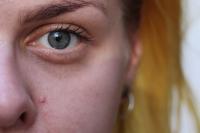 “When I was little, I was mesmerized listening to the stories told by my grandparents. My grandfather was a sailor. He travelled to the poles for exploration and when he returned he would tell us a lot of stories. It is a very special thing for me to tell my family's stories. What about my grandmother! My grandmother had an incredible imagination. She made up stories. My favorite story was 'Kai Hai'. It was the name of a shark, Kai.
“When I was little, I was mesmerized listening to the stories told by my grandparents. My grandfather was a sailor. He travelled to the poles for exploration and when he returned he would tell us a lot of stories. It is a very special thing for me to tell my family's stories. What about my grandmother! My grandmother had an incredible imagination. She made up stories. My favorite story was 'Kai Hai'. It was the name of a shark, Kai.
29.01.2020 | by Sinem Taş
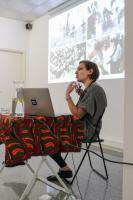 My research on the nonaligned comes from a cultural and art-historical position. It is an interdisciplinary approach to understanding how the non-aligned movement, apart from creating political, or social, or economic alliances was also attempting to create cultural alliances that would counter Western cultural hegemony, and what many in the movement, who were interested in culture, also called Western cultural imperialism.
My research on the nonaligned comes from a cultural and art-historical position. It is an interdisciplinary approach to understanding how the non-aligned movement, apart from creating political, or social, or economic alliances was also attempting to create cultural alliances that would counter Western cultural hegemony, and what many in the movement, who were interested in culture, also called Western cultural imperialism.
03.01.2020 | by Iolanda Vasile
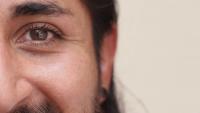 Gabriel was born in 1988, in Colombia, and was adopted by a Norwegian family in 1989. Growing up in a small, pretty little town in east Norway, he was the only brunette among the blonde kids. "You can spot this darker kid in the middle of blue-eyed, blond kids in our class photo for kindergarten. I was aware of how different I was when I was a kid.
Gabriel was born in 1988, in Colombia, and was adopted by a Norwegian family in 1989. Growing up in a small, pretty little town in east Norway, he was the only brunette among the blonde kids. "You can spot this darker kid in the middle of blue-eyed, blond kids in our class photo for kindergarten. I was aware of how different I was when I was a kid.
23.12.2019 | by Sinem Taş
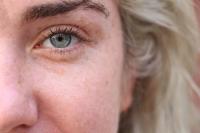 "Mom had this incredible energy. You know science says 'energy cannot be created not destroyed'. The fact that her body has left us doesn't mean she isn't with us. She is everywhere. That's why I got this tattoo: It says 'Death cannot kill'. Though she has left this place, she still continues to teach me a lot".
"Mom had this incredible energy. You know science says 'energy cannot be created not destroyed'. The fact that her body has left us doesn't mean she isn't with us. She is everywhere. That's why I got this tattoo: It says 'Death cannot kill'. Though she has left this place, she still continues to teach me a lot".
14.11.2019 | by Sinem Taş
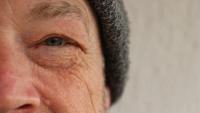 'Pain is inevitable, suffering is optional'' says Steffen, walking slowly in the forest of Fisterra, in Galicia, Spain.
A peace activist who once served in the military at Operation Desert Storm, in 1990, he advocates for the human right to water and sanitation for everyone.
'Pain is inevitable, suffering is optional'' says Steffen, walking slowly in the forest of Fisterra, in Galicia, Spain.
A peace activist who once served in the military at Operation Desert Storm, in 1990, he advocates for the human right to water and sanitation for everyone.
23.10.2019 | by Sinem Taş
 A bridge in Paris... Some dance on it, some watch them, smiling. Some are recording it on their phones, some timidly step forward and leave a little change on the guitar case. Wallace and Youmi continue singing their songs in the best office in the world...
A bridge in Paris... Some dance on it, some watch them, smiling. Some are recording it on their phones, some timidly step forward and leave a little change on the guitar case. Wallace and Youmi continue singing their songs in the best office in the world...
02.10.2019 | by Sinem Taş
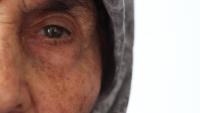 "This isn't the type of thing you want to talk about" she starts, not really interested in sharing the details, but everyone would point to her door whenever a traveler or a stranger showed up in town.
"I'd take them in and feed them. Prepare their beds and listen to their sufferings. Then they would leave" says Grandma Cane.
"This isn't the type of thing you want to talk about" she starts, not really interested in sharing the details, but everyone would point to her door whenever a traveler or a stranger showed up in town.
"I'd take them in and feed them. Prepare their beds and listen to their sufferings. Then they would leave" says Grandma Cane.
14.08.2019 | by Sinem Taş
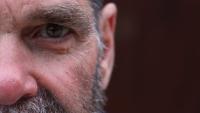 I have met Antonio in the town I was staying at while walking the Camino de Santiago pilgrimage route. We were the only two staying in town that night since it is rare to walk the route during that time of the year. He invited me over for the dinner he prepared for himself. When I asked what I drink should bring for dinner he said "I will drink water, you can bring whatever you like for yourself".
I have met Antonio in the town I was staying at while walking the Camino de Santiago pilgrimage route. We were the only two staying in town that night since it is rare to walk the route during that time of the year. He invited me over for the dinner he prepared for himself. When I asked what I drink should bring for dinner he said "I will drink water, you can bring whatever you like for yourself".
15.05.2019 | by Sinem Taş
 I believe the society is not yet ready for some things. For example when people come close to caress him, the look of love on their faces changes to pitiness. The fact that one is disabled does not mean they cannot understand what's going on around them. I don't blame people for this matter though they need to realize pitying doesn't help at all.''
I believe the society is not yet ready for some things. For example when people come close to caress him, the look of love on their faces changes to pitiness. The fact that one is disabled does not mean they cannot understand what's going on around them. I don't blame people for this matter though they need to realize pitying doesn't help at all.''
04.05.2019 | by Sinem Taş
 'Life's too short to invent problems... It is quite likely that not everything will be the way we want. Everything that happens to us is actually beautiful. All of it! Sadness. sickness, even losing a loved one is beautiful! Cause we learn from these experiences.
'Life's too short to invent problems... It is quite likely that not everything will be the way we want. Everything that happens to us is actually beautiful. All of it! Sadness. sickness, even losing a loved one is beautiful! Cause we learn from these experiences.
27.04.2019 | by Sinem Taş
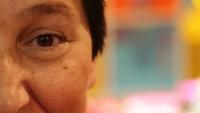 "It had its difficulties of course. There weren't many toy makers in Portugal around that time to start with. Nor were toys of any importance. Just a toy... Which is not the case for me. They all have names, stories. Now I do the job I love every day. I am happy because I do the thing, I love every day. No pressure, no orders and I see happy faces every day. The people that walk in through these doors are special. Cause they know toys are more than just plastic.
"It had its difficulties of course. There weren't many toy makers in Portugal around that time to start with. Nor were toys of any importance. Just a toy... Which is not the case for me. They all have names, stories. Now I do the job I love every day. I am happy because I do the thing, I love every day. No pressure, no orders and I see happy faces every day. The people that walk in through these doors are special. Cause they know toys are more than just plastic.
22.04.2019 | by Sinem Taş
 Certainly, the virtual dimension will take a new importance, also in light of the massive use of digital tools that this new reality brought with itself, but also in relation to the fact that artists might end up not traveling a lot like before…who knows! The art that will change is only in relation to travel and distance. What could definitely change might be the distribution channels, moving more and more into streaming and digital platforms…but I really hope that this won’t happen. The emotion that live art arouses is incomparable.
Certainly, the virtual dimension will take a new importance, also in light of the massive use of digital tools that this new reality brought with itself, but also in relation to the fact that artists might end up not traveling a lot like before…who knows! The art that will change is only in relation to travel and distance. What could definitely change might be the distribution channels, moving more and more into streaming and digital platforms…but I really hope that this won’t happen. The emotion that live art arouses is incomparable.  The oppressive policies and structural inequities that underlie the conditions of poor and working class people’s lives here and abroad date from the first invasion of native territories, and the last few decades have exacerbated these conditions. What our older films reveal is the similarity of conditions now with what existed 50 years ago.
The oppressive policies and structural inequities that underlie the conditions of poor and working class people’s lives here and abroad date from the first invasion of native territories, and the last few decades have exacerbated these conditions. What our older films reveal is the similarity of conditions now with what existed 50 years ago.  In Bisa's artwork , color is a language that speaks about African American evolution from enslavement in the United States to today's ongoing fight for Black liberation Bisa also draws on her Ghanaian heritage by illustrating the vibrancy of Africa's textile and fabric traditions. These artistic methods allow her to examine several themes including family, community, youth and power.
In Bisa's artwork , color is a language that speaks about African American evolution from enslavement in the United States to today's ongoing fight for Black liberation Bisa also draws on her Ghanaian heritage by illustrating the vibrancy of Africa's textile and fabric traditions. These artistic methods allow her to examine several themes including family, community, youth and power.  Today, tens of thousands of girls under the age of 18 were married off. Today, one in three women can expect to experience some form of physical or sexual violence in their lifetime. This needs to change, and it needs to change now. Each of these numbers tells a personal story and each one of these women or girls could have been my friend, my sister, my mother, my daughter, or me. That is what motivates me to create a better world for women and girls, no matter where they may be.
Today, tens of thousands of girls under the age of 18 were married off. Today, one in three women can expect to experience some form of physical or sexual violence in their lifetime. This needs to change, and it needs to change now. Each of these numbers tells a personal story and each one of these women or girls could have been my friend, my sister, my mother, my daughter, or me. That is what motivates me to create a better world for women and girls, no matter where they may be.  Somewhere in between there is something more human that tries to understand these people, imagine if you had to flee your home and you could one carry one thing with you, how would you continue to be yourself? On top of fleeing and experiencing a traumatic conflict you turn up in a place that is supposed to be civilized and you get treated like an abomination. This project is about to try to humanize migrants and make them individuals and real people, our friends, our neighbors.
Somewhere in between there is something more human that tries to understand these people, imagine if you had to flee your home and you could one carry one thing with you, how would you continue to be yourself? On top of fleeing and experiencing a traumatic conflict you turn up in a place that is supposed to be civilized and you get treated like an abomination. This project is about to try to humanize migrants and make them individuals and real people, our friends, our neighbors.  It has to do with the colonial history of Europe as a whole: I see this phenomenon of migration from the global south to the global north as the latest phase in the long history of racialized capitalism and colonialism. Many of these people who are trying to cross are coming from previously colonized countries by Europe. We know that, that long history of colonization has an impact in the present in terms of structural inequality, poverty, dispossession and war, and at the same time that we are seeing is the inability of Europe to come to terms with its own history. Which is a history of colonization, of course, instigated by proto-capitalism and capitalist developments as well as the hierarchy of racialization and the legacy of whiteness and white supremacy which fueled the whole colonial condition.
It has to do with the colonial history of Europe as a whole: I see this phenomenon of migration from the global south to the global north as the latest phase in the long history of racialized capitalism and colonialism. Many of these people who are trying to cross are coming from previously colonized countries by Europe. We know that, that long history of colonization has an impact in the present in terms of structural inequality, poverty, dispossession and war, and at the same time that we are seeing is the inability of Europe to come to terms with its own history. Which is a history of colonization, of course, instigated by proto-capitalism and capitalist developments as well as the hierarchy of racialization and the legacy of whiteness and white supremacy which fueled the whole colonial condition.  Stuart Hall once wrote that James in The Black Jacobins was the first to centre Atlantic slavery in world history – so in this sense the importance of James’s work to these debates is self-evident. Certainly, James’s short discussion on the economic roots of British parliamentary abolitionism formed the essential outline of Eric Williams’s more famous and lengthy contribution in this field – as Williams himself acknowledged, though in my opinion James’s grasp of the modernity of colonial slavery and the slave ships and plantations thanks to his underlying theoretical grasp of the uneven and combined nature of capitalist development meant his analysis of the exact relationship between capitalism and slavery is more sophisticated than that of Williams in many respects.
Stuart Hall once wrote that James in The Black Jacobins was the first to centre Atlantic slavery in world history – so in this sense the importance of James’s work to these debates is self-evident. Certainly, James’s short discussion on the economic roots of British parliamentary abolitionism formed the essential outline of Eric Williams’s more famous and lengthy contribution in this field – as Williams himself acknowledged, though in my opinion James’s grasp of the modernity of colonial slavery and the slave ships and plantations thanks to his underlying theoretical grasp of the uneven and combined nature of capitalist development meant his analysis of the exact relationship between capitalism and slavery is more sophisticated than that of Williams in many respects.  In Toussaint Louverture: A Black Jacobin in the Age of Revolutions (Pluto) Charles Forsdick and Christian Høgsbjerg have produced what is arguably the most important biography of Louverture since CLR James’ magisterial Black Jacobins was first published in 1938. Kicking against the contemporary anti-Black and anti-radical revisionism that downplays the historical importance of the revolution while dismissing the significance of Louverture himself, Forsdick and Hogsbjerg’s short monograph is urgent, timely, and strikingly well-written. They have also created a sort of supplement to the book, editing The Black Jacobins Reader (Duke), an excellent collection of essays, commentaries, and primary source material that provides additional context and critique for the writing, production, and circulations of James’ classic history.
In Toussaint Louverture: A Black Jacobin in the Age of Revolutions (Pluto) Charles Forsdick and Christian Høgsbjerg have produced what is arguably the most important biography of Louverture since CLR James’ magisterial Black Jacobins was first published in 1938. Kicking against the contemporary anti-Black and anti-radical revisionism that downplays the historical importance of the revolution while dismissing the significance of Louverture himself, Forsdick and Hogsbjerg’s short monograph is urgent, timely, and strikingly well-written. They have also created a sort of supplement to the book, editing The Black Jacobins Reader (Duke), an excellent collection of essays, commentaries, and primary source material that provides additional context and critique for the writing, production, and circulations of James’ classic history.  In 2010 Marta Lança set up the BUALA website, of which she is still the editor and the main driving force. To mark the 10th birthday of this unique platform dedicated to “exploring the synergies between art, theory, and activism in order to stimulate public debate about the lasting impact of racism and colonialism across Portuguese-speaking communities”, maat is hosting a special cycle of presentations, talks and screening entitled “and I am sparse in dense fluidity” – Gestures of Freedom”, curated by BUALA’s founder.
In 2010 Marta Lança set up the BUALA website, of which she is still the editor and the main driving force. To mark the 10th birthday of this unique platform dedicated to “exploring the synergies between art, theory, and activism in order to stimulate public debate about the lasting impact of racism and colonialism across Portuguese-speaking communities”, maat is hosting a special cycle of presentations, talks and screening entitled “and I am sparse in dense fluidity” – Gestures of Freedom”, curated by BUALA’s founder.  “When I was little, I was mesmerized listening to the stories told by my grandparents. My grandfather was a sailor. He travelled to the poles for exploration and when he returned he would tell us a lot of stories. It is a very special thing for me to tell my family's stories. What about my grandmother! My grandmother had an incredible imagination. She made up stories. My favorite story was 'Kai Hai'. It was the name of a shark, Kai.
“When I was little, I was mesmerized listening to the stories told by my grandparents. My grandfather was a sailor. He travelled to the poles for exploration and when he returned he would tell us a lot of stories. It is a very special thing for me to tell my family's stories. What about my grandmother! My grandmother had an incredible imagination. She made up stories. My favorite story was 'Kai Hai'. It was the name of a shark, Kai.  My research on the nonaligned comes from a cultural and art-historical position. It is an interdisciplinary approach to understanding how the non-aligned movement, apart from creating political, or social, or economic alliances was also attempting to create cultural alliances that would counter Western cultural hegemony, and what many in the movement, who were interested in culture, also called Western cultural imperialism.
My research on the nonaligned comes from a cultural and art-historical position. It is an interdisciplinary approach to understanding how the non-aligned movement, apart from creating political, or social, or economic alliances was also attempting to create cultural alliances that would counter Western cultural hegemony, and what many in the movement, who were interested in culture, also called Western cultural imperialism.  Gabriel was born in 1988, in Colombia, and was adopted by a Norwegian family in 1989. Growing up in a small, pretty little town in east Norway, he was the only brunette among the blonde kids. "You can spot this darker kid in the middle of blue-eyed, blond kids in our class photo for kindergarten. I was aware of how different I was when I was a kid.
Gabriel was born in 1988, in Colombia, and was adopted by a Norwegian family in 1989. Growing up in a small, pretty little town in east Norway, he was the only brunette among the blonde kids. "You can spot this darker kid in the middle of blue-eyed, blond kids in our class photo for kindergarten. I was aware of how different I was when I was a kid.  "Mom had this incredible energy. You know science says 'energy cannot be created not destroyed'. The fact that her body has left us doesn't mean she isn't with us. She is everywhere. That's why I got this tattoo: It says 'Death cannot kill'. Though she has left this place, she still continues to teach me a lot".
"Mom had this incredible energy. You know science says 'energy cannot be created not destroyed'. The fact that her body has left us doesn't mean she isn't with us. She is everywhere. That's why I got this tattoo: It says 'Death cannot kill'. Though she has left this place, she still continues to teach me a lot".  'Pain is inevitable, suffering is optional'' says Steffen, walking slowly in the forest of Fisterra, in Galicia, Spain.
A peace activist who once served in the military at Operation Desert Storm, in 1990, he advocates for the human right to water and sanitation for everyone.
'Pain is inevitable, suffering is optional'' says Steffen, walking slowly in the forest of Fisterra, in Galicia, Spain.
A peace activist who once served in the military at Operation Desert Storm, in 1990, he advocates for the human right to water and sanitation for everyone.  A bridge in Paris... Some dance on it, some watch them, smiling. Some are recording it on their phones, some timidly step forward and leave a little change on the guitar case. Wallace and Youmi continue singing their songs in the best office in the world...
A bridge in Paris... Some dance on it, some watch them, smiling. Some are recording it on their phones, some timidly step forward and leave a little change on the guitar case. Wallace and Youmi continue singing their songs in the best office in the world...  "This isn't the type of thing you want to talk about" she starts, not really interested in sharing the details, but everyone would point to her door whenever a traveler or a stranger showed up in town.
"I'd take them in and feed them. Prepare their beds and listen to their sufferings. Then they would leave" says Grandma Cane.
"This isn't the type of thing you want to talk about" she starts, not really interested in sharing the details, but everyone would point to her door whenever a traveler or a stranger showed up in town.
"I'd take them in and feed them. Prepare their beds and listen to their sufferings. Then they would leave" says Grandma Cane.  I have met Antonio in the town I was staying at while walking the Camino de Santiago pilgrimage route. We were the only two staying in town that night since it is rare to walk the route during that time of the year. He invited me over for the dinner he prepared for himself. When I asked what I drink should bring for dinner he said "I will drink water, you can bring whatever you like for yourself".
I have met Antonio in the town I was staying at while walking the Camino de Santiago pilgrimage route. We were the only two staying in town that night since it is rare to walk the route during that time of the year. He invited me over for the dinner he prepared for himself. When I asked what I drink should bring for dinner he said "I will drink water, you can bring whatever you like for yourself".  I believe the society is not yet ready for some things. For example when people come close to caress him, the look of love on their faces changes to pitiness. The fact that one is disabled does not mean they cannot understand what's going on around them. I don't blame people for this matter though they need to realize pitying doesn't help at all.''
I believe the society is not yet ready for some things. For example when people come close to caress him, the look of love on their faces changes to pitiness. The fact that one is disabled does not mean they cannot understand what's going on around them. I don't blame people for this matter though they need to realize pitying doesn't help at all.''  'Life's too short to invent problems... It is quite likely that not everything will be the way we want. Everything that happens to us is actually beautiful. All of it! Sadness. sickness, even losing a loved one is beautiful! Cause we learn from these experiences.
'Life's too short to invent problems... It is quite likely that not everything will be the way we want. Everything that happens to us is actually beautiful. All of it! Sadness. sickness, even losing a loved one is beautiful! Cause we learn from these experiences.  "It had its difficulties of course. There weren't many toy makers in Portugal around that time to start with. Nor were toys of any importance. Just a toy... Which is not the case for me. They all have names, stories. Now I do the job I love every day. I am happy because I do the thing, I love every day. No pressure, no orders and I see happy faces every day. The people that walk in through these doors are special. Cause they know toys are more than just plastic.
"It had its difficulties of course. There weren't many toy makers in Portugal around that time to start with. Nor were toys of any importance. Just a toy... Which is not the case for me. They all have names, stories. Now I do the job I love every day. I am happy because I do the thing, I love every day. No pressure, no orders and I see happy faces every day. The people that walk in through these doors are special. Cause they know toys are more than just plastic. 